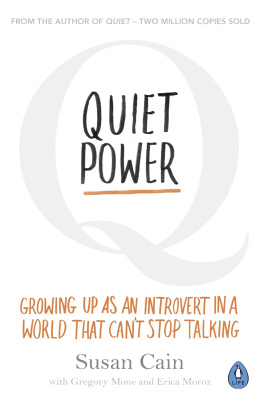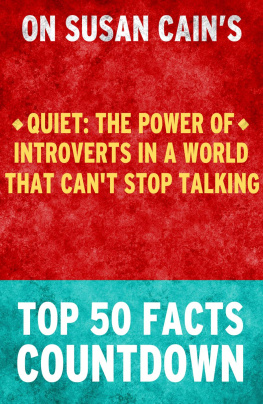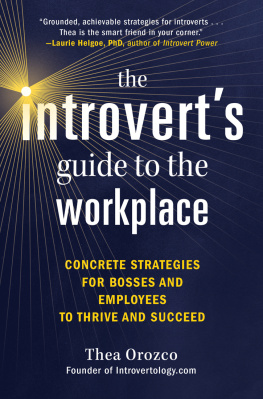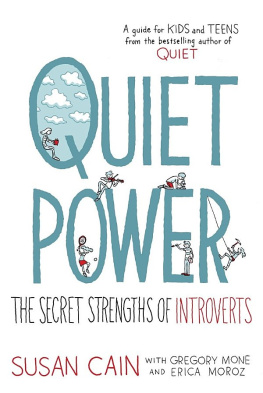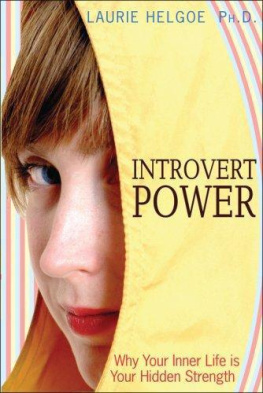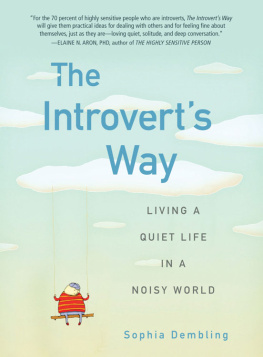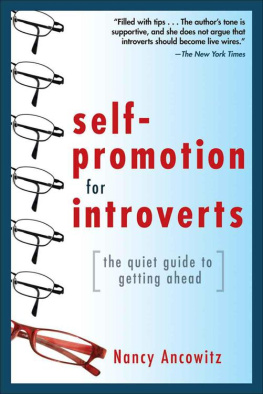Published by arrangement with Hodder & Stoughton Ltd. First published in the United Kingdom in 2017.
Penguin supports copyright. Copyright fuels creativity, encourages diverse voices, promotes free speech, and creates a vibrant culture. Thank you for buying an authorized edition of this book and for complying with copyright laws by not reproducing, scanning, or distributing any part of it in any form without permission. You are supporting writers and allowing Penguin to continue to publish books for every reader.
TarcherPerigee with tp colophon is a registered trademark of Penguin Random House LLC.
Names: Holman, Rebecca, author.
Title: Quiet girls can run the world : owning your power when youre not the alpha in the room / Rebecca Holman.
Description: New York : TarcherPerigee, 2018. | Originally published in 2017 in Great Britain as: Beta : quiet girls can run the world. | Includes index. |
Identifiers: LCCN 2018014794 (print) | LCCN 2018015989 (ebook) | ISBN 9780525505334 (ebook) | ISBN 9780143133537 (pbk.)
Subjects: LCSH: Women executivesPsychology. | Success in businessPsychological aspects. | WorkPsychological aspects.
Classification: LCC HD6054.3 (ebook) | LCC HD6054.3 .H646 2018 (print) | DDC 658.4/09082dc23
p. cm.
INTRODUCTION
You know that woman who isnt speaking in the meeting youre attending? Shes the only person who hasnt shared her thoughts on the presentation youve just watched (and youre kind of glad: youve been in the room for ninety minutes now and definitely have better things to do with your day). But her silence is in contrast to the rest of the room, and you cant work out if its because shes intimidated (there are a lot of big personalities in the room), bored, disinterested, or she just doesnt have anything to say because she isnt that bright.
What you cant see is that while everyone else in the room is engaging in a robust exchange of views, shes taking notes and thinking things through. While theyre getting sucked into a pointless argument, shes trying to solve the problem. And, to save time, shell probably email her thoughts after the meeting to the person who presented. She realizes that by doing so, she may not get credit for solving the problem, but its the easiest way to do it.
Shes the Beta woman and shes been getting stuff done all over your office, and you probably hadnt noticed. In short, the Beta woman is the quiet, thoughtful, modest counterpart to her outspoken, obviously confident Alpha colleague. In a world that champions shouting the loudest, both IRL and online, were told that women need to act a certain way to rise to the top in the workplaceto be big, brash, and Alpha. The reality is that any individual woman is far more complex than that, so why be so reductive?
Lets rewind. Its seven years ago. Im at the bar on a Friday night with my new team. Two weeks before, I became their boss when I landed a job editing a womens website that had been wildly successful and was now in sharp decline. It would have taken a Herculean effort to turn it around, and as I was a relatively inexperienced, very timid editor, no one was sure if I was up to the job. Least of all me.
Apparently this was the first thing wed all agreed on.
They think you wont last, that youll be out in six months, one of my new colleagues conspiratorially told me, in an ill-judged, booze-fueled attempt at bonding. I stared at him aghast, my mouth hanging open. But I think theyre wrong. Theres a lot more going on there, he added quickly, when he realized his attempt to be named Employee of the Month had backfired. Still waters run deep, and all that. As he rambled on, my face felt hot and I flushed. What if they were right? If they all thought that, surely they must be right.
If it hadnt been a Friday night, I would have resigned immediately. Instead, I got annihilated and did some pretty horrific snot-crying on the bus ride home, accompanied by a dark cloud of self-doubt that lasted far beyond my hangover.
Two years later, its about 11:00 a.m. on a Tuesday morning in November. Im in the back of a taxi, and Im struggling to breathe. Twenty minutes earlier, I was in the office, having just taken some new medication for the migraines that had been plaguing me for months. Almost instantly, my chest and the back of my throat had tightened in an allergic reaction.
Im attempting to call my doctor while trying to work out whether to get the driver to take me home or to the hospital. But my overriding thought is, Ive got to get back to my desk or to my laptop before anyone notices Ive gone. Any anxiety I feel over the allergic reaction, or any concern at having had three migraines every week for the last eight, is overridden by the fear that Ill be found out for what I am: not passionate enough, not committed enough, not anything enough for my job. That I dont deserve it.
A migraine isnt a good enough reason not to reply immediately to an email, and a trip to the emergency room is no excuse for missing a deadline. Therefore, Im failing.
Last year, I worked something out. I realized that, although I have very few of the obvious qualities one imagines an editor would possessat least in the Meryl Streep, Devil Wears Prada vein (sharp suit, icy stare)Im okay at my job. Scratch that: Im good at my job. But I only got okay, then good at it, when I worked out that embracing who I was and what I was good at, rather than pretending to be someone else, was the only thing that was going to work. The minute I stopped questioning whether I was the right person for the role and focused on doing the job, everything fell into place. Basically, I embraced my inner Beta.
But you dont have to do it my wayspending the better part of a decade sweaty-palmed in meetings, panicking every Sunday night, and penning imaginary resignation letters twice weekly...
As it happens, Id never seen myself as an editor. Id always known I wanted to write, and as I studied journalism and applied diligently for jobs, I pictured myself as a staff writer somewhereresearching stories, doing interviews, and filing my copy to a shadowy editor figure, who bore no resemblance to the person I imagined my adult self would become. Because, as were told, theres only one type of person who becomes the boss, and I certainly wasnt it.
After I graduated, I started working for a publishing agency in south London. We had a small team and worked on lots of different projects. I was a decent writer, worked hard, and was happy to help out with even the most tedious or laborious tasks, so eventually I was made editor of my own little magazine (I was also the deputy editor, staff writer, and editorial assistant). Then I worked on a bigger magazine, and eventually, I was made editor again, with my own small team to manage.
And then the recession hit. We lost the contract for our magazine, I lost my job, and at age twenty-six, I had to work out how to be a writer, editor, and maybe even a boss outside the confines of the safe little space Id worked in for the last four years.

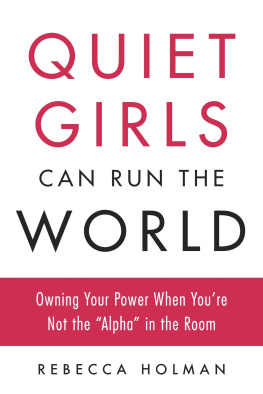
![Syuzan Kejn - Quiet [The Power of Introverts in a World That Can't Stop Talking]](/uploads/posts/book/831856/thumbs/syuzan-kejn-quiet-the-power-of-introverts-in-a.jpg)
